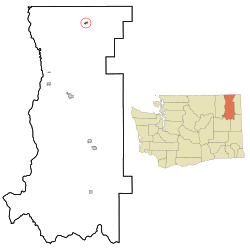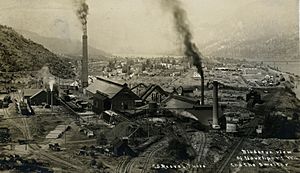Northport, Washington facts for kids
Quick facts for kids
Northport
|
|
|---|---|
| Northport, Washington | |

Location of Northport, Washington
|
|
| Country | United States |
| State | Washington |
| County | Stevens |
| Area | |
| • Total | 0.57 sq mi (1.47 km2) |
| • Land | 0.57 sq mi (1.47 km2) |
| • Water | 0.00 sq mi (0.00 km2) |
| Elevation | 1,335 ft (407 m) |
| Population
(2020)
|
|
| • Total | 297 |
| • Density | 521/sq mi (202.0/km2) |
| Time zone | UTC-8 (Pacific (PST)) |
| • Summer (DST) | UTC-7 (PDT) |
| ZIP code |
99157
|
| Area code | 509 |
| FIPS code | 53-50045 |
| GNIS feature ID | 2413056 |
| Website | Town of Northport |
Northport is a small town in Stevens County, Washington, in the United States. In 2020, about 297 people lived there. It's known for its interesting history, especially with railroads and mining. The town is located near the Columbia River.
Contents
History of Northport
Northport started in 1892 because of railroads. A man named Daniel C. Corbin bought land by the Columbia River. He wanted to extend his railway, the Spokane Falls and Northern Railway (S&FN), to reach rich mining areas in southern British Columbia, Canada. Northport became an important stop for trains going into Canada.
Riverboats also played a role. They traveled from Northport to Revelstoke, British Columbia. In 1895, Northport became an international port of entry, meaning people and goods could officially cross the border there.
Fires and Mining Booms
Northport faced challenges, including major fires. In March 1896, a big fire destroyed or damaged many businesses. But the town quickly recovered.
Around this time, new mining opportunities opened up. The northern part of the Colville Indian Reservation, across the river, was opened for mining. Many miners came to Northport to record their claims and get supplies.
Important ores like copper, gold, and silver were found in Canada near Rossland, British Columbia. Miners used wagons to bring the ore to Northport. From there, it was shipped by train. This showed a great need for more rail transport.
Railroad Expansion and Smelters
In 1896, construction began on a new railroad, the Columbia and Red Mountain. A ferry was built at Northport to carry train engines and cars across the Columbia River. Later, a bridge was built in 1897. Northport became a busy railway hub, connecting Spokane to the Canadian mining districts.
The mines in Red Mountain produced so much ore that the smelter in Trail, British Columbia, couldn't handle it all. A smelter is a factory that melts ore to separate valuable metals. Northport was a good location for a new smelter because it had limestone and good rail connections.
Construction of the Northport smelter began in 1897 and it started working in 1898. It employed hundreds of people. This brought a lot of growth to the town.
Town Incorporation and Later Years
On May 3, 1898, another large fire burned down the entire business district. But once again, the town was quickly rebuilt.
In June 1898, the people of Northport voted to become an official "City of Northport." This meant the town could collect money to improve streets, build sidewalks, and have its own fire department and police.
The smelter mostly processed copper and gold ores. However, in 1906, it started to slow down and eventually closed in 1911. This was a tough time for Northport. The population dropped, and many businesses closed.
Another big fire hit Northport on July 22, 1914, destroying more businesses and the train depot.
But there was hope! In 1915, the smelter was bought by new companies. It was updated to process lead ores and reopened in 1916. However, after World War I, the demand for lead fell, and the smelter closed again in 1921. The plant was later taken apart, and the "boom days" of Northport ended.
The Trail Smelter Case
In 1925, a smelter in Trail, British Columbia, increased its sulfur emissions. This toxic smoke drifted down the river valley into the United States, harming trees, crops, and animals in Northport. Local farmers formed a group to bring attention to the problem.
This led to an important international case. The United States and Canada discussed the issue, and it became the first time air pollution was brought before an international court. After many years, in 1941, a decision was made. Canada paid money to the affected farmers.
This case became very important for international environmental law. It set a rule that no country has the right to cause serious pollution in another country's territory.
Northport got its name because it was once the northernmost town on the S&FN railway line.
Geography and Climate
Northport is located at 48°54′52″N 117°46′56″W / 48.91444°N 117.78222°W. The town covers about 0.58 square miles (1.47 square kilometers) of land.
Northport's Climate
Northport has a climate with big differences between seasons. Summers are warm to hot, and winters are cold, sometimes very cold. This type of climate is called a humid continental climate.
The hottest temperature ever recorded in Northport was 113°F (45°C) in June 2021. The coldest was -32°F (-36°C) in January 1909. Even during normal winters, days can stay below freezing. Warm nights are rare, with the warmest ever being 73°F (23°C) in August 1945.
| Climate data for Northport, Washington (1991–2020 normals, extremes 1899–present) | |||||||||||||
|---|---|---|---|---|---|---|---|---|---|---|---|---|---|
| Month | Jan | Feb | Mar | Apr | May | Jun | Jul | Aug | Sep | Oct | Nov | Dec | Year |
| Record high °F (°C) | 57 (14) |
60 (16) |
76 (24) |
92 (33) |
102 (39) |
113 (45) |
111 (44) |
109 (43) |
105 (41) |
87 (31) |
69 (21) |
58 (14) |
113 (45) |
| Mean maximum °F (°C) | 44.4 (6.9) |
51.3 (10.7) |
65.0 (18.3) |
77.5 (25.3) |
87.5 (30.8) |
91.8 (33.2) |
99.1 (37.3) |
99.8 (37.7) |
90.7 (32.6) |
73.5 (23.1) |
55.7 (13.2) |
44.9 (7.2) |
101.4 (38.6) |
| Mean daily maximum °F (°C) | 31.1 (−0.5) |
38.7 (3.7) |
49.1 (9.5) |
59.6 (15.3) |
69.6 (20.9) |
75.2 (24.0) |
85.4 (29.7) |
85.7 (29.8) |
75.2 (24.0) |
56.9 (13.8) |
40.5 (4.7) |
31.5 (−0.3) |
58.2 (14.6) |
| Daily mean °F (°C) | 25.8 (−3.4) |
30.3 (−0.9) |
38.1 (3.4) |
46.1 (7.8) |
55.2 (12.9) |
60.9 (16.1) |
68.0 (20.0) |
67.7 (19.8) |
58.9 (14.9) |
45.4 (7.4) |
33.9 (1.1) |
26.5 (−3.1) |
46.4 (8.0) |
| Mean daily minimum °F (°C) | 20.5 (−6.4) |
22.0 (−5.6) |
27.2 (−2.7) |
32.7 (0.4) |
40.8 (4.9) |
46.7 (8.2) |
50.7 (10.4) |
49.7 (9.8) |
42.6 (5.9) |
33.9 (1.1) |
27.3 (−2.6) |
21.5 (−5.8) |
34.6 (1.4) |
| Mean minimum °F (°C) | 3.6 (−15.8) |
11.0 (−11.7) |
18.5 (−7.5) |
25.2 (−3.8) |
31.3 (−0.4) |
38.0 (3.3) |
43.4 (6.3) |
42.7 (5.9) |
33.7 (0.9) |
22.3 (−5.4) |
14.6 (−9.7) |
7.1 (−13.8) |
−1.9 (−18.8) |
| Record low °F (°C) | −32 (−36) |
−27 (−33) |
−11 (−24) |
12 (−11) |
20 (−7) |
26 (−3) |
30 (−1) |
26 (−3) |
17 (−8) |
6 (−14) |
−11 (−24) |
−28 (−33) |
−32 (−36) |
| Average precipitation inches (mm) | 2.24 (57) |
1.32 (34) |
1.64 (42) |
1.68 (43) |
2.12 (54) |
2.44 (62) |
1.01 (26) |
0.61 (15) |
0.97 (25) |
1.56 (40) |
2.24 (57) |
2.47 (63) |
20.30 (516) |
| Average snowfall inches (cm) | 15.8 (40) |
5.9 (15) |
1.7 (4.3) |
0.1 (0.25) |
0.0 (0.0) |
0.0 (0.0) |
0.0 (0.0) |
0.0 (0.0) |
0.0 (0.0) |
0.2 (0.51) |
5.9 (15) |
17.0 (43) |
46.6 (118.06) |
| Average extreme snow depth inches (cm) | 12.8 (33) |
8.7 (22) |
3.5 (8.9) |
0.0 (0.0) |
0.0 (0.0) |
0.0 (0.0) |
0.0 (0.0) |
0.0 (0.0) |
0.0 (0.0) |
0.0 (0.0) |
3.3 (8.4) |
10.5 (27) |
14.4 (37) |
| Average precipitation days (≥ 0.01 in) | 12.1 | 8.7 | 9.5 | 9.1 | 10.2 | 10.1 | 5.3 | 3.5 | 5.4 | 9.0 | 12.0 | 13.1 | 108.0 |
| Average snowy days (≥ 0.1 in) | 7.0 | 3.5 | 1.4 | 0.1 | 0.0 | 0.0 | 0.0 | 0.0 | 0.0 | 0.1 | 2.8 | 8.7 | 23.6 |
| Source 1: NOAA | |||||||||||||
| Source 2: National Weather Service | |||||||||||||
Population of Northport
| Historical population | |||
|---|---|---|---|
| Census | Pop. | %± | |
| 1900 | 787 | — | |
| 1910 | 476 | −39.5% | |
| 1920 | 906 | 90.3% | |
| 1930 | 391 | −56.8% | |
| 1940 | 427 | 9.2% | |
| 1950 | 487 | 14.1% | |
| 1960 | 482 | −1.0% | |
| 1970 | 423 | −12.2% | |
| 1980 | 368 | −13.0% | |
| 1990 | 308 | −16.3% | |
| 2000 | 336 | 9.1% | |
| 2010 | 295 | −12.2% | |
| 2020 | 297 | 0.7% | |
| U.S. Decennial Census 2015 Estimate |
|||
Northport's Population in 2010
In 2010, Northport had 295 people living in 139 households. About 24.5% of these households had children under 18. Many households were married couples living together (38.1%).
Most of the people in Northport were White (94.2%). There were also small percentages of African American, Native American, and Asian residents. About 4.1% of the population was Hispanic or Latino.
The average age in Northport was 48.5 years. About 21% of residents were under 18, and 18.3% were 65 or older. The town had a nearly equal number of males (50.2%) and females (49.8%).
Janni's Chimney: A Mining Mystery
Peter Janni, who was born in Italy in 1874, came to America and eventually settled in Northport. In 1923, he bought a limestone quarry south of town. He shipped limestone all over Washington.
His quarry was in an area known for valuable minerals. In 1953, Janni's workers found a "chimney" of galena, which is a type of ore rich in silver. This chimney was about 6 feet by 5 feet (1.8 m by 1.5 m).
They dug down and shipped almost forty tons of this high-quality ore to a refinery. Janni's workers wanted to keep digging, but he stopped them. He said, "maybe someday we will dig her up again."
Why he stopped remains a mystery. Some older residents of Northport believe that this rich silver chimney is still buried in the quarry today.
See also
 In Spanish: Northport (Washington) para niños
In Spanish: Northport (Washington) para niños
 | Audre Lorde |
 | John Berry Meachum |
 | Ferdinand Lee Barnett |


